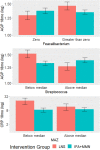Infant gut microbiota characteristics generally do not modify effects of lipid-based nutrient supplementation on growth or inflammation: secondary analysis of a randomized controlled trial in Malawi
- PMID: 32908192
- PMCID: PMC7481312
- DOI: 10.1038/s41598-020-71922-x
Infant gut microbiota characteristics generally do not modify effects of lipid-based nutrient supplementation on growth or inflammation: secondary analysis of a randomized controlled trial in Malawi
Abstract
An unhealthy gut microbial community may act as a barrier to improvement in growth and health outcomes in response to nutritional interventions. The objective of this analysis was to determine whether the infant microbiota modified the effects of a randomized controlled trial of lipid-based nutrient supplements (LNS) in Malawi on growth and inflammation at 12 and 18 months, respectively. We characterized baseline microbiota composition of fecal samples at 6 months of age (n = 506, prior to infant supplementation, which extended to 18 months) using 16S rRNA gene sequencing of the V4 region. Features of the gut microbiota previously identified as being involved in fatty acid or micronutrient metabolism or in outcomes relating to growth and inflammation, especially in children, were investigated. Prior to correction for multiple hypothesis testing, the effects of LNS on growth appeared to be modified by Clostridium (p-for-interaction = 0.02), Ruminococcus (p-for-interaction = 0.007), and Firmicutes (p-for-interaction = 0.04) and effects on inflammation appeared to be modified by Faecalibacterium (p-for-interaction = 0.03) and Streptococcus (p-for-interaction = 0.004). However, after correction for multiple hypothesis testing these findings were not statistically significant, suggesting that the gut microbiota did not alter the effect of LNS on infant growth and inflammation in this cohort.
Conflict of interest statement
The authors declare no competing interests.
Figures




Similar articles
-
Provision of Lipid-Based Nutrient Supplements to Mothers During Pregnancy and 6 Months Postpartum and to Their Infants from 6 to 18 Months Promotes Infant Gut Microbiota Diversity at 18 Months of Age but Not Microbiota Maturation in a Rural Malawian Setting: Secondary Outcomes of a Randomized Trial.J Nutr. 2020 Apr 1;150(4):918-928. doi: 10.1093/jn/nxz298. J Nutr. 2020. PMID: 31909811 Free PMC article. Clinical Trial.
-
Gut microbiota in Malawian infants in a nutritional supplementation trial.Trop Med Int Health. 2016 Feb;21(2):283-90. doi: 10.1111/tmi.12650. Epub 2015 Dec 21. Trop Med Int Health. 2016. PMID: 26644222 Clinical Trial.
-
Effects of maternal and child lipid-based nutrient supplements on infant development: a randomized trial in Malawi.Am J Clin Nutr. 2016 Mar;103(3):784-93. doi: 10.3945/ajcn.115.114579. Epub 2016 Feb 3. Am J Clin Nutr. 2016. PMID: 26843155 Clinical Trial.
-
Impact of Maternal Nutritional Supplementation during Pregnancy and Lactation on the Infant Gut or Breastmilk Microbiota: A Systematic Review.Nutrients. 2021 Mar 30;13(4):1137. doi: 10.3390/nu13041137. Nutrients. 2021. PMID: 33808265 Free PMC article.
-
Impact of nutrient supplementation on maternal nutrition and child growth and development in Sub-Saharan Africa: the case of small-quantity lipid-based nutrient supplements.Matern Child Nutr. 2020 Dec;16 Suppl 3(Suppl 3):e12960. doi: 10.1111/mcn.12960. Matern Child Nutr. 2020. PMID: 33347727 Free PMC article. Review.
Cited by
-
A Scoping Review Evaluating the Current State of Gut Microbiota Research in Africa.Microorganisms. 2023 Aug 20;11(8):2118. doi: 10.3390/microorganisms11082118. Microorganisms. 2023. PMID: 37630678 Free PMC article.
-
Bifidobacterium longum and microbiome maturation modify a nutrient intervention for stunting in Zimbabwean infants.EBioMedicine. 2024 Oct;108:105362. doi: 10.1016/j.ebiom.2024.105362. Epub 2024 Sep 27. EBioMedicine. 2024. PMID: 39341154 Free PMC article.
-
Gut Microbiome-Targeted Nutrition Interventions and Growth among Children in Low- and Middle-Income Countries: A Systematic Review and Meta-Analysis.Curr Dev Nutr. 2024 Feb 14;8(3):102085. doi: 10.1016/j.cdnut.2024.102085. eCollection 2024 Mar. Curr Dev Nutr. 2024. PMID: 38455707 Free PMC article.
-
Colonization during a key developmental window reveals microbiota-dependent shifts in growth and immunity during undernutrition.Microbiome. 2024 Apr 9;12(1):71. doi: 10.1186/s40168-024-01783-3. Microbiome. 2024. PMID: 38589975 Free PMC article.
-
The gut microbiome and early-life growth in a population with high prevalence of stunting.Nat Commun. 2023 Feb 14;14(1):654. doi: 10.1038/s41467-023-36135-6. Nat Commun. 2023. PMID: 36788215 Free PMC article.
References
-
- Ashorn P, et al. Supplementation of maternal diets during pregnancy and for 6 months postpartum and infant diets thereafter with small-quantity lipid-based nutrient supplements does not promote child growth by 18 months of age in rural malawi: a randomized controlled trial. J. Nutr. 2015;145:1345–1353. doi: 10.3945/jn.114.207225. - DOI - PubMed
-
- Ruel, M. T., Alderman, H., Maternal & Group, C. N. S. Nutrition-sensitive interventions and programmes: how can they help to accelerate progress in improving maternal and child nutrition? The Lancet382, 536–551 (2013). - PubMed

